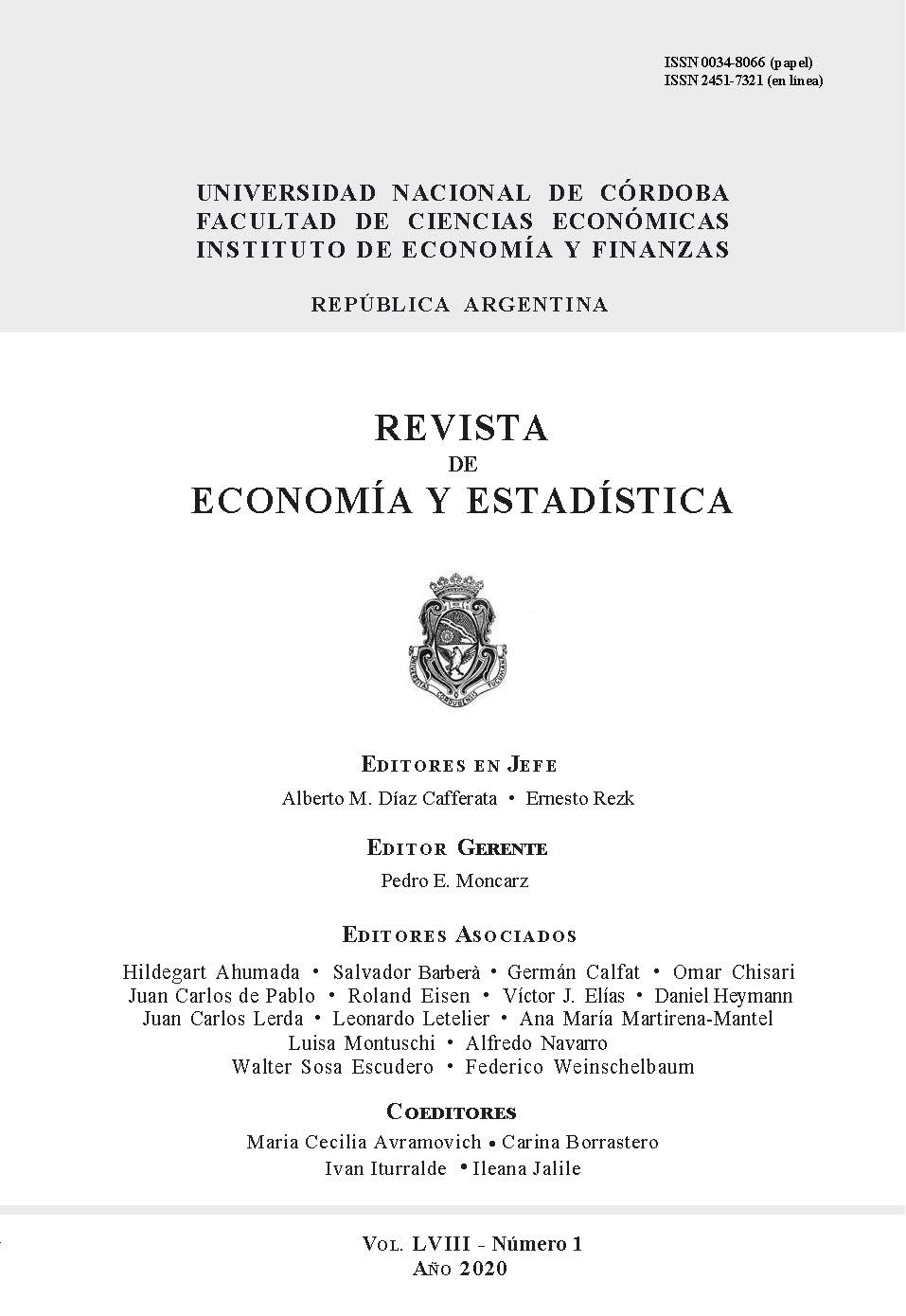Cómo Evitar el Colapso Ecosocial: el Proyecto del Decrecimiento
DOI:
https://doi.org/10.55444/2451.7321.2020.v58.n1.31867Palabras clave:
decrecimiento, economía ecológica, políticas ecosocialesResumen
Un número cada vez más importante de académicas/os y activistas de Europa y más allá promueven el “decrecimiento” como reacción ante un inminente colapso ecosocial. Abogan por transiciones democráticas hacia sociedades postcapitalistas que puedan funcionar dentro de las fronteras ecológicas y, a la vez, ser socialmente equitativas. Este artículo examina qué implica el decrecimiento y realiza un balance de su situación actual como proyecto académico y político. Se sugiere que, mientras que el proyecto académico está floreciendo, el proyecto político continúa siendo marginal. Ante este panorama, se aborda el interrogante de qué sería necesario para que el proyecto político del decrecimiento cobre impulso.
Fecha de recepción: 22 de Febrero de 2020
Fecha de aceptación: 20 de Mayo de 2020
Descargas
Referencias
Alexander, S. (2012). Planned economic contraction: the emerging case for degrowth. Environmental Politics, 21 (3), 349-368.
Barca, S., Chertkovskaya, E. y Paulsson, A. (2019). The End of Political Economy as We Knew It? From Growth Realism to Nomadic Utopianism. En E. Chertkovskaya, A. Paulsson y S. Barca (Eds.), Towards a Political Economy of Degrowth. Rowman and Littlefield.
Blühdorn, I. (2017). Post-capitalism, post-growth, post-consumerism? Eco-political hopes beyond sustainability. Global Discourse, 7 (1), 42-61.
Bohnenberger, K. (2020). Money, Vouchers, Public Infrastructures? A Framework for Sustainable Welfare Benefits. Sustainability 12 (2), 596-626.
Borowy, I. (2013). Degrowth and public health in Cuba: lessons from the past? Journal of Cleaner Production, 38, 17-26.
Bowen, A., y Hepburn, C. (2014). Green growth: an assessment. Oxford Review of Economic Policy, 30 (3), 407-422.
Brand, U., y Wissen, M. (2013). Crisis and continuity of capitalist society-nature relationships: The imperial mode of living and the limits to environmental governance. Review of International Political Economy, 20 (4), 687-711.
Büchs, M., y Koch, M. (2019). Challenges for the degrowth transition: The debate about wellbeing. Futures, 105, 155-165.
Carstensen, MB (2011). Paradigm man vs. the bricoleur: bricolage as an alternative vision of agency in ideational change. European Political Science Review, 3 (1), 147–167.
Chertkovskaya, E., Paulsson, A., Kallis, G., Barca, S., y D’Alisa, G. (2017). The vocabulary of degrowth : A roundtable debate. Ephemera, 17 (March 2016), 189–208.
Concialdi, P. (2018). What does it Mean to be Rich? European Journal of Social Security, 20 (1): 3–20.
Cosme, I., Santos, R., y O’Neill, DW (2017). Assessing the degrowth discourse: A review and analysis of academic degrowth policy proposals. Journal of Cleaner Production, 149, 321-334.
Crouch, C. (2016). The march towards post‐democracy, ten years on. The Political Quarterly, 87 (1), 71-75.
Daly, HE. (1973). Toward a Steady-State Economy. W. H. Freeman and Company.
Daly, HE. (1991). Steady-state economics. Island Press.
Daly, HE. (1996). Beyond Growth. Beacon Press.
D’Alisa, G. y Kallis, G. (2015) Post-normal science. En G. D’Alisa, F. Demaria, y G. Kallis (Eds.), Degrowth. A vocabulary for a new era (págs. 185–188). Routledge.
Demaria, F., Schneider, F., Sekulova, F. y Martinez-Alier, F. (2013). What is degrowth? From an activist slogan to a social movement. Environmental Values, 22 (2), 191–215.
Dengler, C., y Seebacher, L.M. (2019). What about the Global South? Towards a feminist decolonial degrowth approach. Ecological Economics, 157, 246-252.
Doyal, L. y Gough, I. (1991). A Theory of Human Need. Macmillan.
Drews, S., Savin, I., y van den Bergh, JC. (2019). Opinion clusters in academic and public debates on growth-vs-environment. Ecological economics, 157, 141-155.
Fritz, M., y Koch, M. (2014). Potentials for prosperity without growth: Ecological sustainability, social inclusion and the quality of life in 38 countries. Ecological Economics, 108, 191-199.
Georgescu-Roegen, N. (1971). The Entropy Law and the Economic Process. Harvard University Press.
Gorz, A. (1980). Ecology as Politics. Pluto Press.
Gough, I. (2017). Heat, Greed and Human Need. Climate Change, Capitalism and Sustainable Wellbeing. Edward Elgar.
Hassler, A. et al. (2019). Degrowth of Aviation. Reducing Air Travel in a Just Way. Austria: Stay Grounded. Recuperado el 18 de enero de 2020 de https://stay-grounded.org/wp-content/uploads/2020/02/Degrowth-Of-Aviation_2019.pdf
Helne, T. y Hirvilammi, T. (2019). Having, Doing, Loving, Being: Sustainable Well-Being for a Post-Growth Society. En E. Chertkovskaya, A. Paulsson y S. Barca (Eds.), Towards a Political Economy of Degrowth. Rowman and Littlefield.
Hickel, J., y Kallis, G. (2019). Is Green Growth Possible? New Political Economy, 1-18. DOI: 10.1080/13563467.2019.1598964.
Hirsch, F. (1976) .The Social Limits to Growth. Harvard University Press.
Hirvilammi, T. (2020). The Virtuous Circle of Sustainable Welfare as a Transformative Policy Idea. Sustainability, 12 (1), 391.
Hornborg, A. (2017). How to turn an ocean liner: a proposal for voluntary degrowth by redesigning money for sustainability, justice, and resilience. Journal of Political Ecology, 24 (1), 623-632.
Jameson, F. (2003). Future City. New Left Review, 21 (May-June), 65–79.
Joutsenvirta, M. (2016). A practice approach to the institutionalization of economic degrowth. Ecological Economics, 128, 23-32.
Kallis, G., Demaria, F., y D’Alisa, G. (2015). Introduction: Degrowth. En G. D’Alisa, F. Demaria, y G. Kallis (Eds.), Degrowth. A vocabulary for a new era (págs. 1–17). Routledge.
Kallis, G. (2018). Degrowth. Agenda Publishing.
Koch, M. (2012). Capitalism and Climate Change. Palgrave.
Koch, M. (2019). The state in the transformation to a sustainable postgrowth economy. Environmental Politics, 1-19. DOI: 10.1080/09644016.2019.1684738.
Latouche, S. (2009). Farewell to growth. Cambridge, Polity Press.
Leonardi, E. (2019). Bringing Class Analysis Back in: Assessing the Transformation of the Value-Nature Nexus to Strengthen the Connection Between Degrowth and Environmental Justice. Ecological Economics, 156, 83-90.
Martinez-Alier, J. (2012). Environmental justice and economic degrowth: an alliance between two movements. Capitalism Nature Socialism, 23 (1), 51-73.
Max-Neef, M. (2014). The world on a collision course and the need for a new economy. En S. Novkovic y T. Webb (Eds.), Co-operatives in a Post-Growth Era: Creating co-operative economics (págs. 15-38). Zed Books.
Meadows, DH., Meadows, DL., Randers , J. y Behrens WW. (1972) The Limits to Growth. Universe Books.
Nyblom, Å., Isaksson, K., Sanctuary, M., Fransolet, A., y Stigson, P. (2019). Governance and Degrowth. Lessons from the 2008 Financial Crisis in Latvia and Iceland. Sustainability, 11 (6), 1734.
OCDE (2011) Towards Green Growth. Recuperado el 18 de marzo de 2019 de https://www.oecd.org/greengrowth/48012345.pdf
O'Neill, DW. (2012) Measuring progress in the degrowth transition to a steady state economy. Ecological Economics, 84, 221-231.
Oxfam (2015) Extreme carbon inequality. Oxfam Media Briefing, 2 de diciembre.
Parrique, T. (2019). The political economy of degrowth. Tesis doctoral, Clermont Auvergne.
Pizzigati, S. (2018) The Case for a Maximum Wage. Cambridge, Polity Press.
Ripple, W.J., Wolf, C., Newsome, T.M., Barnard, P., y Moomaw, W.R. (2019). World Scientists Warning of a Climate Emergency. BioScience, biz088.
Runciman, D. (2018). How democracy ends. Basic Books.
Sayer, A. (2009). Who’s afraid of critical social science? Current Sociology, 57 (6), 767–86.
Schneider, F., Kallis, G. y Martinez-Alier, J. (2010). Crisis or opportunity? Economic degrowth for social equity and ecological sustainability. Journal of Cleaner Production, 18 (6), 511–518.
Schor, J. (2015) Work sharing. En G. D’Alisa, F. Demaria, y G. Kallis (Eds.), Degrowth. A vocabulary for a new era (págs. 195–197). Routledge.
Spangenberg, JH. (2016). The world we see shapes the world we create: how the underlying worldviews lead to different recommendations from environmental and ecological economics – the green economy example. Journal of Sustainable Development, 19 (2), 127-146.
Spash, CL. (2020). A tale of three paradigms: Realising the revolutionary potential of ecological economics. Ecological Economics, 169, 106518. DOI: 10.1016/j.ecolecon.2019.106518
Staricco, JI. (2019). Reclaiming critique in social sciences–or why ‘non-normative critique’ constitutes a contradiction in terms. Distinktion: Journal of Social Theory, 1-19. DOI: 10.1080/1600910X.2019.1658614
Steffen, W., Broadgate, W., Deutsch, L., Gaffney, O., y Ludwig, C. (2015). The trajectory of the Anthropocene: the great acceleration. The Anthropocene Review, 2 (1), 81-98.
Streeck, W. (2016). How Will Capitalism End? Essays on a Failing System. Verso.
ONU (2015) Transforming our world: the 2030 Agenda for Sustainable Development, Resolución adoptada por la Asamblea General el 25 de septiembre de 2015, Naciones Unidas.
PNUMA (2019) Emissions Gap Report 2019, Programa de Naciones Unidas para el Medio Ambiente.
van Apeldoorn, B., y Overbeek, H. (2012). Introduction: The Life Course of the Neoliberal Project and the Global Crisis. En B. van Apeldoorn y H. Overbeek (Eds.), Neoliberalism in Crisis (págs. 1–20). Palgrave.
Weiss, M., y Cattaneo, C. (2017). Degrowth–taking stock and reviewing an emerging academic paradigm. Ecological Economics, 137, 220-230.
Descargas
Publicado
Número
Sección
Licencia
Derechos de autor 2020 Hubert Buch-Hansen

Esta obra está bajo una licencia internacional Creative Commons Atribución-NoComercial-SinDerivadas 4.0.
Aquellos autores/as que tengan publicaciones con esta revista, aceptan los términos siguientes:
Los autores/as conservarán sus derechos de autor y garantizarán a la revista el derecho de primera publicación de su obra, el cuál estará simultáneamente sujeto a la Licencia Creative Commons Atribución-NoComercial-SinDerivar 4.0 Internacional que permite a terceros compartir la obra siempre que se indique su autor y su primera publicación esta revista.
Los autores/as podrán adoptar otros acuerdos de licencia no exclusiva de distribución de la versión de la obra publicada (p. ej.: depositarla en un archivo telemático institucional o publicarla en un volumen monográfico) siempre que se indique la publicación inicial en esta revista.
Se permite y recomienda a los autores/as difundir su obra a través de Internet (p. ej.: en archivos telemáticos institucionales o en su página web) antes y durante el proceso de envío, lo cual puede producir intercambios interesantes y aumentar las citas de la obra publicada. (Véase El efecto del acceso abierto)














